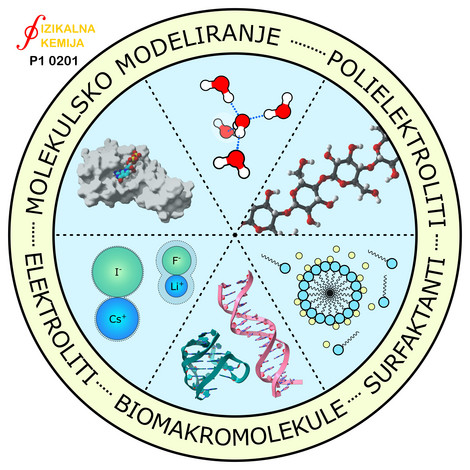Physical chemistry
P1-0201
Duration: 1.1.2022 - 31.12.2027
Head:
prof. dr.
Lukšič Miha
The researchers of the Programme Group P1-0201 - Physical Chemistry are members of the Department of Physical Chemistry at the Faculty of Chemistry and Chemical Technology, University of Ljubljana. We are engaged in research that enriches the fundamental and applied knowledge in the field of physical chemistry, in particular the physical chemistry of liquids, solutions and colloidal dispersions, through a combination of modern experimental and theoretical methods. The study and understanding of the properties of liquids and their mixtures, especially aqueous solutions of hydrophobic, polar, and ionic solvents (from simple electrolytes to complex biopolymers such as proteins and nucleic acids), is important for a variety of technological, industrial, and pharmaceutical processes, as well as for biochemical processes in living organisms. In addition, knowledge of the properties of aqueous solutions of polyelectrolytes, colloids, surfactants and the interactions between them and surfaces plays an important role in ecology and industry. Understanding the relationships between the structure and dynamics of colloidal systems is crucial for the development and application of new nanotechnologies in various fields.

Our research focuses on hydration and ion-specific effects in aqueous solutions. Water plays a key role in many processes, but its role at the microscopic level is not yet fully understood. Water is also an ecological solvent and replaces organic solvents wherever possible. In addition to water and aqueous solutions, we are also studying other green solvents and ionic liquids, as well as delamination processes of layered materials that are important for energy storage materials and their green and sustainable production, electronic components, biosensors, catalysis, and medicine. Broadly speaking, our activities are as follows:
- We develop statistical mechanical models of water that enable us to understand many anomalous properties of water, as well as hydration models of hydrophobes and ions.
- We study experimentally and theoretically the solutions of synthetic and natural polymers, and polyelectrolytes in particular.
- A large part of our research is devoted to the solutions of surfactants and the phenomena of self-organization in these solutions (micellization, formation of vesicles, liposomes, bilayers).
- We study the phase stability of protein formulations (from globular to antibodies) and the role of co-solutes in these processes. We also focus on biomacromolecules in confined environments.
- We study the thermodynamic, kinetic and structural properties of the regulation of toxin-antitoxin modules and non-canonical nucleic acid structures (G-quadruplexes).
- We are developing new architectures for electrochromic devices and biosensors.
- We deal with chemoinformatics, molecular docking methods and pharmacophore modelling, machine learning, and distributed computing software development.
We develop theoretical approaches to describe and interpret the results of our experimental research. In our experimental work we use a variety of calorimetric (ITC, DSC) and spectroscopic techniques (UV-Vis, fluorimetry, circular dichroism, NMR), conductometry, chromatography, rheology, tensiometry, light scattering techniques (SLS, DLS, ELS, SAXS). We have two laboratories accredited to work with genetically modified organisms. In the field of theoretical chemistry, we deal with quantum chemistry, computer simulations (Monte Carlo, molecular dynamics), molecular docking and chemionformatics, and various theories (electrostatic theories, thermodynamic perturbation theory, integral equations).
Members of the Programme Group P1-0201 publish their research results in prestigious international scientific journals and present them at numerous international scientific meetings and at many foreign universities and institutes. We coordinate several (bilateral) projects promoting international research and participate in many COST actions. We act as (guest) editors or as members of the organizing committees of national and international conferences. We are involved in more than 40 different courses in the field of physical chemistry and related sciences, attended annually by more than 1300 students from different faculties of UL. We place great emphasis on the pedagogical work and incorporate the results of our research into our lectures. Without good teachers there are no good schools, and without research there are no good teachers. We have led a number of ŠIPK and PKP projects that allow us to integrate research and contacts with industry into the educational process itself. We bring our knowledge to industry to help solve technological challenges. We work closely with our former students, especially PhD students, who are employed by these companies. In this way, the group deepens theoretical and experimental knowledge in physical chemistry and transfers it to undergraduate and graduate students as well as to industrial practice. The researchers also contribute to strengthening the national identity and cultural heritage by raising Slovenia's profile in the world. One of the ways we do this is by being mentors for students who are very successful in the International Chemistry Olympiad (IChO). We are also involved in the implementation of the International Master's Degree in Chemistry (2nd cycle) in cooperation with the University of Strasbourg, France, as part of a double degree programme.
Our main goal is to understand the properties of matter at the molecular level. Each member of the group has excellent knowledge in his or her field of research, but at the same time our knowledge overlaps and complements to such an extent that we can successfully collaborate, which increases the synergistic effect of the group.
P1-0201 PROGRAMME GROUP MEMBERS:
Researchers: Marija Bešter-Rogač, Janez Cerar, Andrej Godec, San Hadži, Barbara Hribar Lee, Andrej Jamnik, Ksenija Kogej, Jurij Lah, Miha Lukšič (head), Žiga Medoš, Črtomir Podlipnik, Jurij Reščič, Bojan Šarac, Matija Tomšič, Tomaž Urbič, Vojeslav Vlachy
Professional associates: Vesna Arrigler, Mirzet Čuskić, Tone Kelbl
Young researchers: Tilen Berglez, Jernej Imperl, Peter Ogrin, Uroš Zavrtanik, Zala Živič.